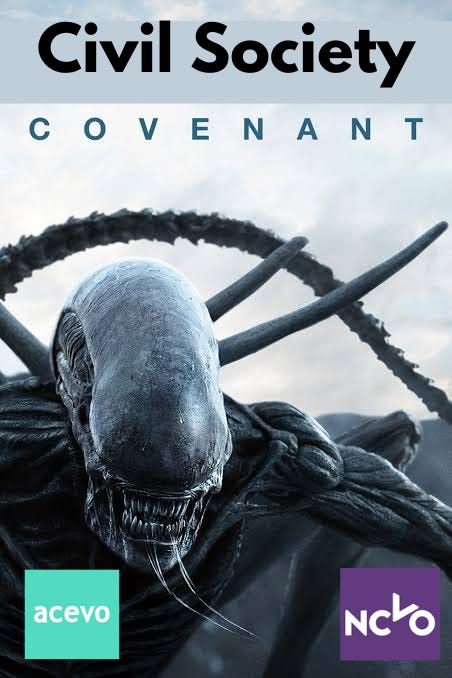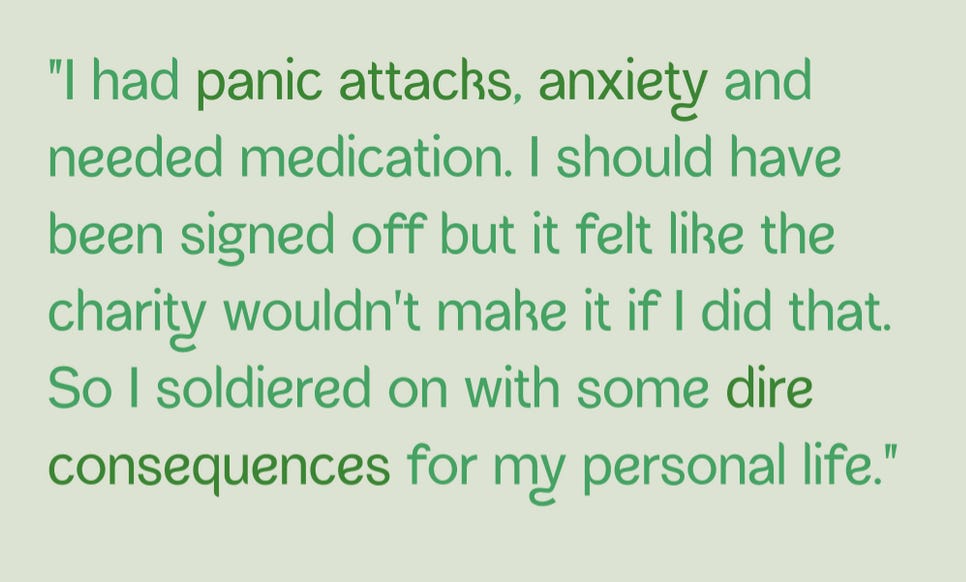Grantmakers have to get better at explaining ourselves.
More on grantmaking, closures and contractions, and a 'Covenant' for our Barely Civil Society.....
Grantmaking: what’s happening?
I don’t think anyone is in any doubt at this stage that we’re facing a very bad time in the UK’s nonprofit sector at the moment. I spoke to some very sympathetic, thoughtful, and concerned, grantmakers, in a group discussing the current pickle the other day. Amongst other things, I wanted to get across that issue with small charities losing their paid for, professional, substantive positions, and how quickly that can fragment and cause further damage their ability to help - or survive.
We also talked about the difficulty of closing down. Those conversations always turn quickly to the tough decisions, or beneficiaries, but they rarely touch on the reality of one of the biggest barriers to closure - especially orderly closure. That’s around financial costs of closure: and in, particular, redundancy costs. Even if organisations get to the stage where they choose to close, the most common issue I have seen for the smallest and most longstanding charities is very practical and financial. They are essentially facing insolvency and disorderly closedown simply because their reserves aren't sufficient to pay redundancy costs to shrink down. So they can't even afford to shrink or close. Yes, this is poor management - we all know we need to keep wind up costs in reserves. But reality bites, and many trustees do not understand the reality of this until it is far too late.
Not only is this then ugly for services and beneficiaries - it is also going to mean a lot of financial hardship for people who have worked like dogs in the sector for many years and then find themselves without a final paycheque.
And on that, I just feel a lot of sadness and sympathy for people who are losing their jobs. We need to remember that many people who work for charities are already using food banks, have little or no pensions (the VCS was one of the absolute stragglers on this front), are poorly paid on short term contracts, and suffer from the same issues as the client group they support. When we are talking about the impact of closures and cuts on our beneficiaries, we are also often talking about our staff, directly or otherwise. Either way, they have a right to decent treatment. They will be facing significant hardship as they look at unemployment in the worst market since 2010.
Market correction?
At the same meeting, it was interesting to talk to someone who was even older than me - which I didn’t think was possible - who remembered ‘the last time’ the sector hit a crunch. She put it at 2007-8; I put it more around 2010-11. The latter was when, especially, the youth sector hit the s/kids. (I was in my first CEO job and we very nearly didn’t make it.) The thing that strikes me as being different this time is that there was some sense of new opportunities and higher morale. New SFA and ESF contracts (remember those!) were appearing, albeit the dreaded payment by results. The Work Programme, which didn’t really Work, was being touted around as the only show in town, and while many private sector providers led (Reed, Serco, Capita) alongside, cough, ‘social businesses’ like Working Links and A4E, small charities tried to pile into the supplier list. Working Links and A4E tanked, and so did many of the small charities (including one I had previously worked for).
But for those who didn’t take that particular poison pill, trusts and foundations pulled others through. And there was at least a myth: the Big Society bollocks which some people just about forced themselves to believe (that and the ‘social enterprise’; give me strength.) And don’t forget, some charities who were well-connected politically or socially made money hand over fist during this time (eg. Kids Company). It felt much more like a reset or market correction. This time it doesn’t feel like that at all.
And on the subject of market correction - a phrase I struggled to find the other day before a whip-smart colleague found it for me - the problem, as she noted, is that capitalism is not good at market corrections when what matters is people’s lives. Without a planned economy in a sector delivering care, the contraction is bound to hit the least powerful, poorest, and least popular. Imagine the NHS had to have a market correction based on capitalist principles: we need to stop doing cancer care, because it costs a bloody fortune and makes no money at all. However, our private nose job clinic is going gangbusters. In fact I think that was Liz Truss’s plan, wasn’t it?
“War” between funders and funded?
Some unhelpful interventions continue at the moment from those who are trying to position themselves as the straw-man voice of reason in the discussions about recent funder ‘pauses’. Some have framed concerns raised as a ‘battle’ between grantmakers and grantees. Well, this is overheated. As I’ve said before, there is special concern among the smaller and medium sized grantmakers, who just can’t cope with the knock-on effects. Meanwhile, fundraisers and grantees are not irrationally demanding, but rather trying to explain the very significant economic and social impacts of what appears to be insufficient coordination between trusts. Even within the ‘camps’, I suspect there have been strong voices on either side even within paused organisations. And I’ve heard some fundraisers complaining about the ‘entitlement’ of some charities, not to mention the common refrain of ‘too many charities’.
Grantmakers and grantees: we need to understand each other
Understanding the ‘why’ of all this is so important, and I don’t think this has been properly explained. One CEO of a closed/ paused grantmaker went into detail about the reasons for a pause in an interview in Third Sector magazine. That helped me understand the decision much better, even if I still don’t agree. How unfortunate, however, that most of their grant recipients will not be able to afford to read it behind the paywall. It took me more than a week to find a colleague of a friend of a friend who could get access without me laying out £400 for a subscription. Yes, journalism needs to be paid for, but realistically, who can afford that in the small VCS? Let me be clear: this isn’t just carping. It’s a sign that grant makers need to get better at talking to the wider sector, and not just each other, or to occasional grantees who get invited in for a focus group. I was reflecting with a colleague this week that most people in delivery organisations truly do not understand what grantmakers do on a daily basis. (That was me, until a few years ago.) Let alone understanding why they do anything they do. That issue needs to be solved, and that involves a communications plan that addresses the sector as a whole, using channels that are accessible. ACF, any interest?
The key reason for this is that, while I think it’s untrue and unhelpful to describe a battle between team grantmaker and team fundraiser at the moment, nobody can deny the general sense of distrust in the dynamic. This issue is one we need to start to address head on. After all, the sense of perceived disjoint between funder and funded would be considered a serious workforce issue if we were in a single organisation: where we believe that the ‘managers don’t care about the staff’. We need to address this as a sector. No small part of that would be unpacking why that comparison (with ‘managers’ and ‘workers’) seems to describe the relationship quite so well….
Civil Society Covenant: In charities, no-one can hear you scream
Speaking of infrastructure, this week, VCS infrastructure bodies, none of which I am allowed to join, have been talking to the Government about setting up a ‘Civil Society Covenant.’ Very helpfully, this seems to be moving towards several positive suggestions, including that this Government will not encourage far-right rioters to burn down our community advice centres. I mean, I guess we are at the stage where that’s a win, but honestly, it’s not great is it?
Anyway, the key strands to date are:
Recognition: To ensure a strong and independent civil society
Partnership: To ensure effective service delivery and policy-making
Participation: To ensure people and communities can be heard and make a difference
Transparency: To ensure civil society and government have the information needed to best serve people and communities
The idea that the Government will pay attention to civil society and treat it responsibly is vital. Still, of the four pillars suggested so far, there is one which is conspicuously absent, and it rhymes with ££££££££. That is, how is the VCS going to be paid for? And what will happen to the public sector, which has already dumped all of its work on us for 14 years, and looks about to go into even deeper austerity?
Despite my obvious political proclivities, I’ve made clear from the start of the recent election cycle that I knew the one thing Labour would never commit is more money. But we do need some serious ideas from the Government.
One idea I’ve been throwing around is a permanent endowment for a VCS infrastructure. This could be public money, or something that forward thinking funders who are closing down could do together. Or beyond that, there is always NESTA, which I have always thought would work very well as a permanent source of infrastructural support for the Third Sector. (Much as, I know, flying cars are cool.) They have a big hunk of money, and their annual income is significant - could it be repurposed for more clearly social value? (See, already I’ve made another enemy.)
Anyway, a great initiative, and NCVO and ACEVO are seeking input from the wider sector. You can give them your thoughts at this link.
Mental health and small charities
Meanwhile, as charities start to suffer even worse than previously, Fair Collective have just previewed their research into the mental health of small charity CEOs. This was truly upsetting to read, and it’s only the first few slides.
I have long seen the toll that small charities take on the mental health of all involved - and it is getting much worse. It’s just not good enough, honestly, and we have no unions to protect us.
Some advice for CEOs: take a break. It will not fall apart. And even if it does, you are more important: put on your own oxygen mask first.
At a more strategic level, Lloyds Foundation’s research and report in mental health week made it clear that there needed to be strong and strategic action to help create a ‘resilient’ sector - which includes in terms of mental health given the horrific pressure staff are under. Below, #2 ‘Investing in Orghanisational Resilience and Staff Wellbeing’ is especially important, but let’s face it - most of us don’t even have an HR department. And nobody ever uses EAP services. The other things they mention should have a significant impact in themselves however - more stability, for example, would remove some of the most desperate financial stress that staff (and especially CEOs) face. As well as providing some more certainty of livelihood for all the people working there.
Lloyds Bank Foundation
This #WorldMentalHealthDay, we call on the government and sector to support and foster a resilient population of smaller charities so they can continue to their essential work that will be needed over the coming months and years.
Here's how:
1: Longer-term #UnrestrictedFunding rooted in trust
2: Investing in #OrganisationalResilience and staff wellbeing
3: Sustaining and building on partnership working
4: A robust welfare safety net to meet the needs of people
5. Sustainable resourcing for public services, particularly local government funding
Read more about our recommendations on our website
https://lnkd.in/entEJ2eR
And yet, this not where things are going, I fear….
And finally, some good news….
It feels like we all need to hear some good news, so here it is.
“Sales of Boris Johnson’s memoir slump by 62% in second week, Aletha Adu, the Guardian, 24th October 2024
Former prime minster’s heavily promoted book, Unleashed, just hung on to bestseller spot in UK.”
Sorry, that’s the best I can manage.




